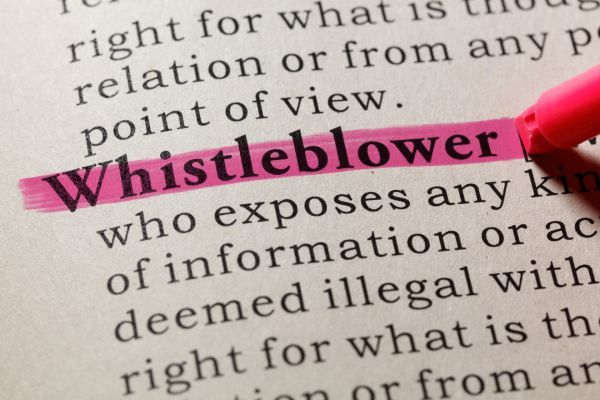Whistleblower claims play a crucial role in exposing illegal activities, fraud, and unethical behavior within companies and organizations. If you’ve witnessed misconduct in your workplace and are considering coming forward, it’s important to understand your rights and the legal protections available to you. Reporting wrongdoing can be daunting, but with the right legal support, you can hold accountable those responsible without risking retaliation.
When it comes to whistleblower claims, having experienced legal support can make all the difference. From advising you on your options to representing you if retaliation occurs, a lawyer familiar with Michigan's specific whistleblower protections will advocate for your best interests. If you’re ready to explore your options, call (313) 513-1919 today to discuss how a federal attorney can assist in protecting your rights and helping you make an impactful stand against workplace misconduct.
What Qualifies as Whistleblowing?
Whistleblowing involves reporting misconduct, criminal actions, or unethical behavior within an organization. For an action to qualify as whistleblowing and receive legal protections, it typically must meet several criteria:
- Illegal Conduct: The reported activity must involve illegal conduct, such as fraudulent activity, theft, or violations of laws and regulations. Activities that breach federal or state laws usually qualify.
- Fraud: Whistleblowing often includes reporting fraud, such as falsifying financial records or engaging in insider trading. This also covers reports of fraud against government programs under laws like the False Claims Act.
- Ethical Violations: Ethical violations that go against an organization’s policies or professional standards can also qualify as whistleblowing. This includes workplace harassment, unlawful discrimination, or unsafe working conditions.
- Good Faith Reporting: Whistleblowers must act in good faith, believing the reported information is true and represents genuine wrongdoing. Their intent should be to inform appropriate authorities.
- Disclosure to Appropriate Parties: Whistleblowing can happen internally (to a supervisor or HR) or externally (to regulatory agencies). The choice of disclosure channel can impact the protections available.
- Retaliation for Reporting: Typically, an individual must face retaliation for their report to qualify as whistleblowing. This can include termination, demotion, or harassment linked to their disclosure.
Understanding these criteria is vital for anyone considering reporting misconduct. Each element, from the nature of the reported activity to the context of the disclosure, plays a critical role in determining whether the act qualifies for whistleblower protections. Consulting with a legal professional can help clarify rights and options for those who believe they have valid claims.
Whistleblower Protections Under Federal and State Laws
Whistleblower protections under federal and Michigan laws are designed to shield employees who report illegal or unethical activities within their organization from retaliation. Here’s an overview of these protections:
Federal Whistleblower Protections
Federal law provides robust protections for whistleblowers across various sectors, particularly through acts such as:
- Whistleblower Protection Act (WPA):
The WPA protects federal employees who disclose information they reasonably believe shows evidence of illegal conduct, gross mismanagement, gross waste of funds, abuse of authority, or substantial danger to public health or safety. It prohibits retaliation such as demotion, suspension, harassment, or firing. - Sarbanes-Oxley Act (SOX): SOX provides protections for employees of publicly traded companies who report securities fraud, accounting irregularities, or other legal violations related to shareholder rights. SOX allows whistleblowers to file a complaint with the Occupational Safety and Health Administration (OSHA) if they face retaliation for reporting misconduct.
- False Claims Act (FCA): The FCA incentivizes whistleblowers (or "relators") to report fraud against the federal government. It includes a “qui tam” provision, allowing individuals to file lawsuits on behalf of the government and receive a portion of recovered funds. It also protects employees from retaliation by allowing whistleblowers to sue for damages if they face discrimination.
- Dodd-Frank Wall Street Reform and Consumer Protection Act: Dodd-Frank act offers protections similar to SOX but also incentivizes whistleblowers by offering financial rewards for information leading to successful enforcement actions. Dodd-Frank covers employees in the financial services sector and allows whistleblowers to report legal violations confidentially.

Michigan Whistleblower Protection Act (WPA)
Michigan’s Whistleblower Protection Act specifically safeguards employees within the state who report alleged violations of state law, rules, or regulations. Key protections under this act include:
- Prohibition of Retaliation: The Michigan WPA prohibits employers from discharging, threatening, or otherwise discriminating against employees who, in good faith, report a violation of law to a public body or are asked to participate in an investigation, hearing, or trial.
- Scope of Coverage: The Michigan WPA covers both public and private employees. To qualify, the employee must report or be about to report an actual or suspected violation of law to a public body.
- Timeframe for Legal Action: Employees who experience retaliation under the Michigan WPA have 90 days from the date of the alleged violation to file a complaint. Remedies may include reinstatement, back pay, full fringe benefits, and legal costs.
Whistleblower protections under federal and Michigan laws play a critical role in promoting ethical conduct and protecting individuals who report wrongdoing. Understanding these protections helps employees make informed decisions about reporting misconduct and navigating any retaliation that may arise. Consulting with a qualified attorney can help ensure whistleblower rights are upheld and remedies pursued effectively.
Retaliation Against Whistleblowers
Whistleblowers often face significant risks, including various forms of retaliation from their employers. Such retaliation is illegal under numerous whistleblower protection laws. Common forms of retaliation include:
- Wrongful Termination: Whistleblowers may be fired for reporting misconduct, even when acting in good faith. This not only harms the individual but also undermines accountability.
- Demotion: Employers might demote whistleblowers by reducing their job title, responsibilities, or salary, attempting to punish them for their actions and create a hostile work environment.
- Harassment: Harassment can occur through hostile behavior, increased scrutiny, or bullying, making it difficult for whistleblowers to perform their jobs effectively.
- Threats: Intimidation can take the form of verbal threats or implicit warnings about job security, discouraging individuals from pursuing their claims.
Retaliation against whistleblowers is illegal under various laws, such as the Whistleblower Protection Act. These laws are meant to protect individuals who report wrongdoing, ensuring they can do so without fear of retaliation.
Whistleblowers who experience retaliation may have legal options to seek compensation. They can file complaints with government agencies or pursue lawsuits for violations of their rights. Understanding these protections is crucial for anyone considering whistleblowing. Seeking legal counsel can help if retaliation occurs after making a disclosure.
Filing a Whistleblower Claim
Filing a whistleblower claim involves several important steps that help protect your rights while ensuring that the report of wrongdoing is taken seriously. Here’s a breakdown of the process:
- Understand the Legal Protections: Before filing a claim, it’s essential to familiarize yourself with the legal protections available to whistleblowers. Both federal and state laws protect whistleblowers from retaliation after reporting misconduct. Knowing your rights can empower you during the process.
- Gather Evidence: Collecting evidence is a critical first step. Document any illegal conduct, fraud, or unethical behavior you have witnessed. This can include emails, memos, reports, or any other relevant documentation that supports your claim. The more detailed and organized your evidence is, the stronger your case will be.
- Identify the Appropriate Agency: Determine which agency or organization you should report to based on the nature of the misconduct. For example, if you are reporting government fraud you might file under the False Claims Act with the appropriate federal agency. If the issue involves workplace safety, you could report to the Occupational Safety and Health Administration (OSHA).
- File the Complaint: Once you have your evidence and identified the appropriate agency, you can file your whistleblower complaint. This usually involves completing a specific form and submitting it through the agency's website or via mail. Ensure that your complaint clearly outlines the misconduct, includes all supporting evidence, and specifies your contact information.
- Consider Legal Assistance: While it’s possible to file a whistleblower claim on your own, consulting with an attorney who specializes in whistleblower protection can be beneficial. A whistleblower lawyer can help you navigate the complexities of the process, ensure that your rights are protected, and provide guidance on the best strategies for your case.
- Prepare for Follow-Up: After filing your claim, be prepared for follow-up actions. The agency may contact you for additional information or clarification. Respond promptly and thoroughly to any inquiries, as this can help strengthen your case.
- Be Aware of Confidentiality: Depending on the agency and type of complaint, you may have the option to remain anonymous. However, understand that anonymity may limit the agency's ability to investigate the claim. If you choose to disclose your identity, ensure you understand the potential risks and protections available to you.
- Monitor the Process: Keep track of your claim and any communications with the agency. Document all interactions and maintain a record of any correspondence related to your whistleblower claim. This information can be crucial if any retaliation occurs after your report.

Filing a whistleblower claim can be a complex process, but it plays a vital role in promoting accountability and transparency. By understanding your rights, gathering evidence, and following the appropriate steps, you can take meaningful action against misconduct while protecting yourself from retaliation.
How long do I have to file a whistleblower claim?
The time frame for filing a whistleblower claim can vary depending on whether you're pursuing a claim under federal law or Michigan law.
Federal Law
Under federal law, specifically the Whistleblower Protection Act, you typically have three years from the date of the alleged retaliation to file a claim. This includes cases involving retaliation for reporting illegal practices or safety violations. It’s important to note that while the timeframe is generally three years, specific federal programs may have different deadlines, so reviewing the applicable law is crucial.
Michigan Law
In Michigan, the timeline to file a whistleblower claim varies depending on the type of claim. For legal claims under the Michigan Whistleblowers' Protection Act, you have 90 days from the date of the retaliatory action to file a claim in court. This shorter timeframe emphasizes the importance of acting quickly if you believe you have experienced retaliation for reporting misconduct.
Filing your claim within these time limits is essential. Failing to meet the deadlines may result in losing your right to pursue legal action. If you believe you have a whistleblower claim, consulting a legal professional can help ensure that you understand the specific timeframes and requirements relevant to your situation.
Get Support for Your Whistleblower Claim
If you’re considering blowing the whistle on criminal activity or unethical practices, having experienced legal representation is essential. A whistleblower claim can be complex, and navigating it without proper guidance can leave you vulnerable to retaliation. Protect your legal rights and ensure your case is handled with care by seeking the support of a knowledgeable attorney.
Reach out to our law firm today to schedule a consultation and learn how we can assist you in pursuing your whistleblower claim while safeguarding your career and future. Your courage to speak up deserves strong legal advocacy.
